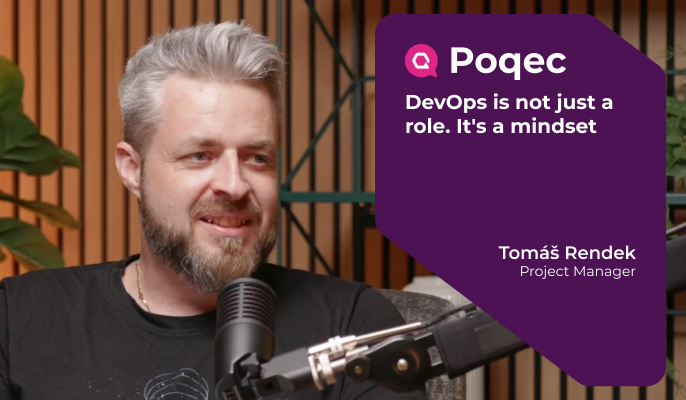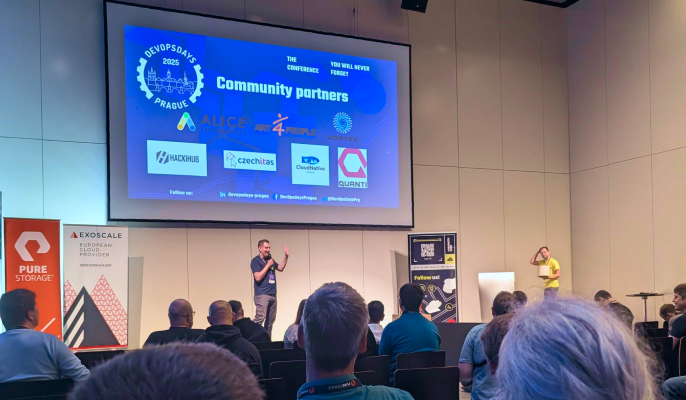DevOps Is Not Just a Role. It's a Mindset.
Application development is no longer just about writing code. For software to truly work, it's not enough to simply build it. You need to think about where it runs, how it runs, and in what condition. That’s where DevOps comes in — an approach that bridges development and operations. Efficiently, automatically, and with a strong focus on quality.
“DevOps isn’t a job title to me. It’s a direction in IT development that evolved over time, connecting development with operations,” says Tomáš Rendek, a seasoned DevOps expert.
A Quick Look at DevOps History
Today, DevOps feels like a natural part of software development, but just a few years ago, hardly anyone talked about it.
The term “DevOps” was coined in 2009 by Patrick Debois, who organized the first DevOps Days in Ghent, Belgium. The goal was simple: bring developers and operations teams together — two groups that used to pass responsibility back and forth rather than collaborate.
By 2011, Gartner predicted DevOps would become a standard strategy among Global 2000 companies by 2015. And they were right. DevOps is now not only mainstream, but it’s the foundation of efficient development in the cloud. It’s a combination of culture, processes, and tools that help companies respond faster, more reliably, and with fewer errors.
What started as a rebellion against the rigid “dev vs. ops” model has evolved into an approach that shapes the architecture of modern digital services.
Tools like Kubernetes, Terraform, or GitLab CI/CD have made DevOps the cornerstone of modern engineering — across industries and company sizes.
DevOps as a Philosophy of Collaboration
DevOps isn’t a label on a job title. It’s about how teams communicate, how they hand off work, and how they prevent issues before they occur. It’s not just about clicking around in the cloud. A DevOps mindset means thinking through the entire application lifecycle — from the first line of code to smooth production operation.
An experienced DevOps specialist combines technical know-how with organizational insight. They understand what a rollback is, why logs matter, how alerts work — and also why a product is being deployed now and what the business expects from it.
Why DevOps?
When we asked Tomáš on our podcast what DevOps really means and what it brings to companies, he answered simply: it’s about delivering quality, safely, and without unnecessary downtime.
DevOps today is synonymous with automation — from building, testing, to deployment. It shortens development cycles, increases stability, and reduces errors.
But it’s not just about stability. DevOps enables companies to respond faster to change, scale operations as needed, and reduce costs through more efficient team collaboration. Measurement plays a key role too: “When tests fail, it shouldn’t end with someone just switching them off. DevOps ensures everything makes sense, is measurable, and above all — repeatable,” as we hear on the podcast.
Why Companies Need DevOps
DevOps isn’t a buzzword — it’s a response to real challenges in modern development. It helps companies deploy software more frequently, securely, and with fewer risks. According to the GitLab State of DevOps report, teams using DevOps deploy up to 46 times more often than those that don’t.
The main benefits? Speed, quality, cost savings, and better collaboration.
Automation and shared responsibility across developers, testers, and operations ensure that everyone knows what’s happening — and why. This leads to faster customer response, better scalability, and lower maintenance costs.
Measurement is crucial. When tests fail, the system should offer clear feedback, not just highlight an error, but guide the solution.
And it goes beyond development. DevOps is now key to cloud adoption, building secure pipelines (DevSecOps), and scaling digital products. Gartner predicts that by 2025, 95% of workloads will run in the cloud, supported by DevOps processes.
In Short: DevOps Is the New Standard.
Where to Start?
If you're just beginning with DevOps, start with your processes.
Map out everything from writing code to deployment.
Where are the bottlenecks?
Where’s time being lost?
What can be automated?
Don’t look for perfection — look for opportunities to improve.
Need advice on where to start or how to take your DevOps further?
Get in touch!
We’d love to have a casual chat and suggest a solution that fits your needs.


.svg)







